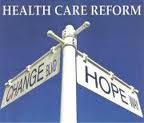
by | Jun 29, 2012
 Following the Supreme Court ruling upholding The Affordable Care Act, the financial fallout for the American people must be re-highlighted. We will have political analysis in the coming days, but for now here are the facts regarding the tax implications of this law
Following the Supreme Court ruling upholding The Affordable Care Act, the financial fallout for the American people must be re-highlighted. We will have political analysis in the coming days, but for now here are the facts regarding the tax implications of this law
Comprehensive List of Tax Hikes in Obamacare
Individual Mandate Excise Tax(Jan 2014): Starting in 2014, anyone not buying “qualifying†health insurance must pay an income surtax according to the higher of the following
|
1 Adult |
2 Adults |
3+ Adults |
| 2014 |
1% AGI/$95 |
1% AGI/$190 |
1% AGI/$285 |
| 2015 |
2% AGI/$325 |
2% AGI/$650 |
2% AGI/$975 |
| 2016 + |
2.5% AGI/$695 |
2.5% AGI/$1390 |
2.5% AGI/$2085 |
Exemptions for religious objectors, undocumented immigrants, prisoners, those earning less than the poverty line, members of Indian tribes, and hardship cases (determined by HHS)
Employer Mandate Tax(Jan 2014): If an employer does not offer health coverage, and at least one employee qualifies for a health tax credit, the employer must pay an additional non-deductible tax of $2000 for all full-time employees. This provision applies to all employers with 50 or more employees. If any employee actually receives coverage through the exchange, the penalty on the employer for that employee rises to $3000. If the employer requires a waiting period to enroll in coverage of 30-60 days, there is a $400 tax per employee ($600 if the period is 60 days or longer).
Combined score of individual and employer mandate tax penalty: $65 billion/10 years
Surtax on Investment Income ($123 billion/Jan. 2013): This increase involves the creation of a new, 3.8 percent surtax on investment income earned in households making at least $250,000 ($200,000 single). This would result in the following top tax rates on investment income
|
Capital Gains |
Dividends |
Other* |
| 2010-2012 |
15% |
15% |
35% |
| 2013+ (current law) |
23.8% |
43.4% |
43.4% |
| 2013+ (Obama budget) |
23.8% |
23.8% |
43.4% |
*Other unearned income includes (for surtax purposes) gross income from interest, annuities, royalties, net rents, and passive income in partnerships and Subchapter-S corporations. It does not include municipal bond interest or life insurance proceeds, since those do not add to gross income. It does not include active trade or business income, fair market value sales of ownership in pass-through entities, or distributions from retirement plans. The 3.8% surtax does not apply to non-resident aliens.
Excise Tax on Comprehensive Health Insurance Plans($32 bil/Jan 2018): Starting in 2018, new 40 percent excise tax on “Cadillac†health insurance plans ($10,200 single/$27,500 family). For early retirees and high-risk professions exists a higher threshold ($11,500 single/$29,450 family). CPI +1 percentage point indexed.
Hike in Medicare Payroll Tax($86.8 bil/Jan 2013): Current law and changes:
|
First $200,000 ($250,000 Married) Employer/Employee |
All Remaining Wages Employer/Employee |
| Current Law |
1.45%/1.45% 2.9% self-employed |
1.45%/1.45% 2.9% self-employed |
| Obamacare Tax Hike |
1.45%/1.45% 2.9% self-employed |
1.45%/2.35% 3.8% self-employed |
Medicine Cabinet Tax($5 bil/Jan 2011): Americans no longer able to use health savings account (HSA), flexible spending account (FSA), or health reimbursement (HRA) pre-tax dollars to purchase non-prescription, over-the-counter medicines (except insulin)
HSA Withdrawal Tax Hike($1.4 bil/Jan 2011): Increases additional tax on non-medical early withdrawals from an HSA from 10 to 20 percent, disadvantaging them relative to IRAs and other tax-advantaged accounts, which remain at 10 percent.
Flexible Spending Account Cap – aka“Special Needs Kids Taxâ€($13 bil/Jan 2013): Imposes cap of $2500 (Indexed to inflation after 2013) on FSAs (now unlimited). . There is one group of FSA owners for whom this new cap will be particularly cruel and onerous: parents of special needs children. There are thousands of families with special needs children in the United States, and many of them use FSAs to pay for special needs education. Tuition rates at one leading school that teaches special needs children in Washington, D.C. (National Child Research Center) can easily exceed $14,000 per year. Under tax rules, FSA dollars can be used to pay for this type of special needs education.
Tax on Medical Device Manufacturers($20 bil/Jan 2013): Medical device manufacturers employ 360,000 people in 6000 plants across the country. This law imposes a new 2.3% excise tax. Exemptions include items retailing for less than $100.
Raise “Haircut” for Medical Itemized Deduction from 7.5% to 10% of AGI($15.2 bil/Jan 2013): Currently, those facing high medical expenses are allowed a deduction for medical expenses to the extent that those expenses exceed 7.5 percent of adjusted gross income (AGI). The new provision imposes a threshold of 10 percent of AGI; it is waived for 65+ taxpayers in 2013-2016 only.
Tax on Indoor Tanning Services($2.7 billion/July 1, 2010): New 10 percent excise tax on Americans using indoor tanning salons
Elimination of tax deduction for employer-provided retirement Rx drug coverage in coordination with Medicare Part D($4.5 bil/Jan 2013)
Blue Cross/Blue Shield Tax Hike($0.4 bil/Jan 2010): The special tax deduction in current law for Blue Cross/Blue Shield companies would only be allowed if 85 percent or more of premium revenues are spent on clinical services
Excise Tax on Charitable Hospitals(Min$/immediate): $50,000 per hospital if they fail to meet new “community health assessment needs,” “financial assistance,” and “billing and collection” rules set by HHS
Tax on Innovator Drug Companies($22.2 bil/Jan 2010): $2.3 billion annual tax on the industry imposed relative to share of sales made that year.
Tax on Health Insurers($60.1 bil/Jan 2014): Annual tax on the industry imposed relative to health insurance premiums collected that year. The stipulation phases in gradually until 2018, and is fully-imposed on firms with $50 million in profits.
$500,000 Annual Executive Compensation Limit for Health Insurance Executives($0.6 bil/Jan 2013)
Employer Reporting of Insurance on W-2(Min$/Jan 2011): Preamble to taxing health benefits on individual tax returns.
Corporate 1099-MISC Information Reporting($17.1 bil/Jan 2012): Requires businesses to send 1099-MISC information tax forms to corporations (currently limited to individuals), a huge compliance burden for small employers
“Black liquor†tax hike(Tax hike of $23.6 billion). This is a tax increase on a type of bio-fuel.
Codification of the “economic substance doctrineâ€(Tax hike of $4.5 billion). This provision allows the IRS to disallow completely-legal tax deductions and other legal tax-minimizing plans just because the IRS deems that the action lacks “substance†and is merely intended to reduce taxes owed.

by | May 14, 2012
 In a wildly under-reported story, last Monday the Des Moines Register uncovered a shocking fact—Leonard Boswell is a blue dog Democrat.
In a wildly under-reported story, last Monday the Des Moines Register uncovered a shocking fact—Leonard Boswell is a blue dog Democrat.
To anyone paying attention to politics, and familiar with Mr. Boswell’s votes during his last term, this certainly comes as quite the revelation. The front page headline was written by Jennifer Jacobs and titled “Opinions vary on effectiveness of Blue Dog democrat Boswellâ€.
I am far less interested in the article itself than I am in the fact-like pronouncement that Leonard Boswell, especially recently, fits in the “blue dog†pack. Though he is officially a member of a group of U.S House members called the “Blue Dog Coalitionâ€, his voting record puts him so clearly opposite of nearly every one of this coalition’s mission statements that it’s truly laughable.
We will look at the record in a second, but let me first say that this is not the only time the Des Moines Register has been called out here—and technically it could happen almost daily. The reason this headline catches the eye is that with election season underway, characterizations and even subtle hints can go a long way in influence uninformed voters in November. Especially if advertising Boswell as someone who has been tight with the purse strings becomes a campaign strategy, which would be smart politics, this is a notion that has to be quickly and forcefully refuted.
The bottom line is that Leonard Boswell can call himself whatever he wants, and the Register can shrug off critical thinking and follow suit— but that doesn’t make it true. The fact is that if he is a blue dog, then Steve King is socially moderate and Kim Pearson and Tom Shaw “go along to get alongâ€. Let’s dig in…
Blue Dogs
For those unaware, a blue dog Democrat is a legislator in the House who is fiscally conservative and philosophically breaks with their party on the level of government spending and taxation that is appropriate, and by their own definition even moral. Though they recently are trying to branch out into other issues like energy and economic growth, by and large their purpose is to oppose overspending and battle fellow Democrats when need be. This being the case you would expect to see some sort of opposition from “blue dog†Leonard Boswell to the direction the Country has swerved in following President Obama’s election. Instead, in the last three and a half years the national debt has increased $5 trillion dollars—and Mr. Boswell has cast “yea†votes all along the way. Here is the record.
The Record
The following are key votes the Congressman has taken on major tax and spend issues since 2009.
Voted in favor:
• Economic Stimulus Bill—over $800 billion added to the national debt, more than a trillion dollars with interest included (passed the House 246-183 on Feb. 13, 2009).
• Obamacare—price tag of $900 billion over 10 years at passage, most recent CBO scoring nearly doubled this amount to $1.76 trillion (passed the House 219-212 on March 21, 2010).
• Cash For Clunkers –cost of nearly $3 billion (passed the House 316-109 on July 31, 2009).
• Extending Unemployment Benefits—April 15, 2010 (passed 289-112), May 28, 2010 (passed 215-204), and July 22, 2010 (passed 272-152).
• Raising the debt ceiling—passed the House 218-214 on December 16, 2009.
• Cap and Trade—according to the Obama administration itself, would have cost Americans up to $200 billion a year (passed the House 219-212 on June 26, 2009).
Voted against:
• Cut, Cap, and Balance—passed the House 234-190 on July 19th, 2011
• Debt ceiling bill – This is the John Boehner version that would have raised the debt ceiling in exchange for limits on discretionary spending (passed the House 218-210 on July 29, 2011).
• Reducing spending to F.Y 2008 levels—passed the House 256-165 on July 25, 2011.
One can make many claims about Boswell’s last term in Congress, but given this record it is hard to imagine how any fair-minded person could call him fiscally conservative. Besides the unbelievable amount of money he voted to add to our national debt, the other thing to note is how close many of these votes were. In particular, the Obamacare and Cap and Trade votes authorized borrowing hundreds of billions of dollars per year—and passed by a combined 14 votes. If there ever was a time a blue dog would stand up for their principles of responsible spending it would have been then.
Why It Matters
To bolster the claim that he is a centrist, the Register story uses a National Journal analysis of his votes in 2011 (right before an election year) which places him more liberal than 61.8% and more conservative than 38.2% of his fellow House members. While this point is highly arguable, any description of him as concerned with deficits and high taxes cannot be made with a straight face. In our current political climate of outrage over debt, the failure of the Stimulus Bill, and the GSO and Solyndra scandals, any distancing of himself from these issues would be a huge re-election asset—and one he clearly has not earned.
What is really ironic here is the fact that this story follows a weekend in which the Des Moines Register published a piece telling their readers that they would soon be charging for online access to much of their content. This transition has many affiliated with the paper very nervous, as there is a high probability of it being a disaster. As long as they continue doing things like allowing Democratic politicians to self-identify themselves without publicly asking questions like “is Leonard Boswell truly a blue dog?â€â€”not only will their bottom line struggle…they will struggle to remain in operation.

by | Jan 16, 2012
 The gaveling in of the Iowa Legislature’s 84th General Assembly last week signaled an end to the 2012 Presidential Caucus season and the return of a more local political focus for Iowans.
The gaveling in of the Iowa Legislature’s 84th General Assembly last week signaled an end to the 2012 Presidential Caucus season and the return of a more local political focus for Iowans.
There is no doubt that much of the session’s oxygen will be sucked up by the major issues that failed to produce any legislation following last year’s battles. These issues include reforming the tax code, mental health services, and education, as well as another round of sparring over Iowa setting up a health insurance exchange to work in conjunction with Obama Care.
While these will grab a majority of the headlines, and a good share of our attention here at The Conservative Reader: Iowa, there have already been a number of very interesting bills introduced that we will also be following.
As of now the bills and issues outside “the big 4†that we have flagged to watch closely are as follows: Term limits, random drug testing for recipients 84th of certain state benefits, banning red light and speed cameras, and the fate of nuclear power in Iowa.
After being deluged for so many months with candidates and their ever changing poll numbers, it is easy to forget that in many ways the caucus season is an imperfect method for measuring Iowa’s current ideological perspective. Removing the factors attached to individual candidates such as “likeability†and “electabilityâ€, and instead gauging the debate and the public reaction of Iowans to more hyper-local issues is a far more telling indicator of where we stand. Ironically these debates and their results likely will tip our hand as to which Presidential candidate will be awarded our 6 electoral votes in November.
In the following weeks stay tuned for investigations, updates, analysis, and opinions on the major issues being debated at the State House. As mentioned earlier, while we will not ignore the most publicized topics of debate this session, a number of bills that will exist in the shadows of the major priorities are just as important.
Though we will be closely watching with an appropriate level of skepticism, we wish all those involved with the 84th General Assembly well in their efforts to make improvements for all Iowans. When we feel they have achieved improvement—we will trumpet it. When we feel they have caused damage to our way of life—they will be called to account.
On with Democracy…
![The Stench of Impropriety: Your Tax Dollars, Your Body Image, and The Government (Part 2 of 2)]()
by | Jul 22, 2011
 The following is the second installment of a two part piece. The first is entitled “The Stench of Impropriety: Tom Harkin, Al Franken, Herbalife International, and The F.R.E.E.D Actâ€, and can be viewed below.
The following is the second installment of a two part piece. The first is entitled “The Stench of Impropriety: Tom Harkin, Al Franken, Herbalife International, and The F.R.E.E.D Actâ€, and can be viewed below.
In part one of this piece, I introduced you to the relationship between Tom Harkin and his largest campaign contributor, Herbalife International. A partnership that demonstrates the perils of an incestuous system of politics and money, and ultimately played a part in Harkin’s introduction of the F.R.E.E.D. Act in the U.S. Senate. As bad as that looks, what the bill actually proposes to do is just as bad.
The act itself is only impressive in that it manages to hit the Liberal trifecta—it is completely devoid of any traditionally rational Constitutional basis, it increases and empowers an unelected bureaucracy to spend our money, and is a blatant attempt to further grow the entitlement base (which we can’t afford as it is now).
As the name suggests the stated mission of the bill is “to enhance and further research into the prevention and treatment of eating disorders, and for other purposesâ€. The bill opens with an assortment of claims and statistics meant to spur the reader into supporting its “heroic†intentions. Included here is that, “estimates, based on current research, indicate that at least 5,000,000 people in the U.S suffer from eating disorders including anorexia nervosa, bulimia nervosa, binge eating disorder, and eating disorders not otherwise specified†and “anecdotal evidence suggests that as many as 11,000,000 people in the U.S, including 1,000,000 males, may also suffer from these disordersâ€.
Naturally, the way this legislation would solve this problem is to create more agencies, throw an undisclosed amount of money around, and as mentioned above, amend and expand the Social Security Act of 1935 to ensure that we as taxpayers pay as much as possible in curing our fellow citizens’ ills.
The additional bureaucracy it proposes creating would exist inside The Department of Health and Human Services and be named—I kid you not—“The Interagency Eating Disorder Councilâ€, and be funded from 2012 through 2016. To run this Council and to award grants (i.e. our tax dollars) would be the Director of The National Institute of Health, Francis S. Collins. His job would be to hand out money, as he saw fit, to various non-profits, colleges, State or local health departments, and community based organizations.
The bill states that the grant money is to be awarded for, among other things, the following reasons: to conduct a study regarding the economic costs of eating disorders that would “examine years of productive life lost, missed days of work, reduced work productivity, costs of mental health treatment, costs to family, and costs to society as a result of eating disordersâ€. In addition, money would also be required to go to “promoting positive body image development, positive self-esteem development, life skills that take into account cultural and developmental issues and the role of family, school, communities and the connection between emotional and physical health, and the prevention of bullying based on body size, shape, and weight.â€
In short it is an embodiment of the kind of financially irresponsible, Constitution-shredding, emotionally-driven, nanny-state legislation that modern day American liberals have become synonymous with.
When it comes to co-sponsor Sen. Franken, though Herbalife did throw him $250, my sense is that he is in it for the pure ideological benefit of expanding the entitlement base…otherwise known as Section 938 of the F.R.E.E.D Act.
Section 938 is entitled “Grants to Support Patient Advocacyâ€, and would essentially require an unspecified amount of our tax dollars to be spent “diagnosing†people with eating disorders and enrolling them in Federal programs. In the bills words, the funds would be spent to “provide education and outreach in community settings regarding eating disorders and associated health problems, especially among low-income, minority, and medically underserved populationsâ€, (Sect. 938(c)(1)); “providing education and outreach regarding enrollment in health insurance, including enrollment in Medicare, Medicaid, and the Children’s Health Insurance Program (SCHIP)â€, (Sect. 938(c)(6)); and for, “Identifying, referring, and enrolling underserved populations in the appropriate Health Care agencies and community based programs and organizations in order to increase access to high quality health care servicesâ€, (Sect. 938(c)(6)).
It has long been believed by liberals that the surest way to get to a single payer health care system is to get enough people dependent on the government for this service that the private insurance sector can no longer exist. My view is that Sen. Franken (and probably Sen. Klobuchar and Sen. Harkin) wrote this part of the bill to hasten this process by further adding to the 16 million people that Obamacare is already slated to dump into Medicaid in the coming years.
Indeed this bill has a little something for everyone. The citizens among us deemed to have an eating disorder would get free medical attention, Herbalife International would be eligible to bill the Federal government for weight loss and eating disorder “treatmentsâ€, Al Franken could successfully move us one step closer to socialized medicine, and Harkin, well he has already gained $137,916 in campaign contributions (no matter the ultimate fate of the bill).
Those left among us who still respect the Constitution and its clear vision of the role of Federal government know that somewhere along the way we have failed it. Every single element of this bill, from the spirit in which it was offered, the language it contains, and the system it arose from is the epitome of this failure. I would argue that not only does this bill need to be stopped, but the institutionalized system of political donations from private companies needs to be abolished. Until such reform comes there will be no reprieve to the endless wave of disastrous special interest legislation that this bill represents.
It is we the American people that need to be F.R.E.E.D.



![The Stench of Impropriety: Your Tax Dollars, Your Body Image, and The Government (Part 2 of 2)]()
by | Jul 19, 2011
 Harkin and Herbalife
Harkin and Herbalife
Every reasonable American with a pulse knows that much of what goes on in the undercurrents of Washington D.C is disturbing. It is not often, however, that one proposed piece of legislation encapsulates nearly everything that is wrong in our Federal Government, unfortunately that is exactly the case with Senate file 481.
The name of this bill is the Federal Response to Eliminate Eating Disorders, or the F.R.E.E.D Act. It is sponsored by Sen. Tom Harkin (D-IA), co-sponsored by Sen. Al Franken (D-MN) and Sen. Amy Klobuchar (D-MN), and was introduced in the Senate on March 3, 2011. If you have ever wondered what Tom Harkin and Al Franken have been up to lately you are about to find out not just the what, but more appallingly the why.
Before examining the wide ranging particulars of the bill, let us first take a look at a very suspicious factor in its origin— a company called Herbalife International.
Without getting too far into the maze of legislative language (though you are welcome to do just that by following the links), what this bill does is continue the re-write of The Social Security Act of 1935 that The Patient Protection And Affordable Health Care Act (Obamacare) began in 2010.
Specifically the F.R.E.E.D Act does the following:
• Redefines what our tax dollars can pay for by amending Sect.1905 of the Social Security Act (SSA) to add coverage for—screening, counseling, and non-prescription drugs used in the treatment of eating disorders.
• Amends Sect. 1927(d)(2)(A) of the SSA by removing the restriction that specifically excludes payment for—“agents when used for anorexia, weight loss, or weight gainâ€.
• Though it was passed only last year, amends Obamacare to include coverage for eating disorders treatment.
The effective implication of this, among other things, is that it would authorize Medicare and Medicaid pay-outs for over-the-counter drugs used in the “treatment†of eating disorders. For a private company which sells such products this change in the law would represent nothing less than the Holy Grail—government purchased sales.
In what would be a remarkable coincidence, Tom Harkin’s biggest political contributor over the last 22 years is a company called Herbalife International. Not an agro products company, an insurance provider, or a labor union as you may suspect, Herbalife International is in fact a global nutrition and supplement company that specializes in “healthy†weight loss.
Herbalife International earns the distinction of becoming Harkin’s biggest single donor by having given him a total of $137,916.00 since 1989. Between the years 2005-2010 they gave Harkin $55,606.00, a display of generosity which came after already having donated over $40,000.00 to him in the 2004 campaign cycle alone.
Some investigating shows that not only does Herbalife International have a wide range of products directly or indirectly tied to weight gain, weight loss, and eating disorders, but that the issue is one of a deeply personal nature for the company. Herbalife was founded in 1980 by a man named Mark Hughes, now deceased, whose inspiration for starting the company was his belief that his mother died of an eating disorder and an “unhealthy approach to weight lossâ€.
While there is no way of knowing what they have in the future pipeline, the products they currently offer that directly relate to eating disorders include Zinc and Thiamine B1 supplements. The medical link lies in the fact that a person suffering from an eating disorder, by nature, has deficiencies of these compounds in their system, which supplements can effectively correct.
Illustrating the connection between nutritional supplements and eating disorder treatment is a report released by the Royal College of Psychiatrists in London entitled “Guidelines for the nutritional management of anorexia nervosaâ€. One of many similar studies, it recommends that in planning the diet for a patient with anorexia, particular attention should be given to “the need for long-term, well balanced vitamin and mineral supplementationâ€. It goes on to say that “A significant proportion of patients with anorexia nervosa are deficient in thiamine, and the increase in carbohydrate metabolism that occurs during re-feeding may exhaust inadequate thiamine reserves. The use of prophylactic thiamine supplements in oral form is recommended for in-patients and those undergoing rapid weight gainâ€.
In addition to the already defined role that supplements have in treating eating disorders with Zinc and Thiamine, there are ongoing studies looking at whether the lack of these in the body may actually cause the onset of eating disorders, opening the possibility that in the future such supplements may also be used in preventative care.
By all appearances what we have here is a major global company giving a U.S Senator over $90,000.00 in a seven year period and then being the beneficiary of a sweeping piece of legislation, sponsored by said Senator, which authorizes our government to pay for the company’s products.
It would be a mistake to conclude this is a simple case of a company giving a legislator money to be their puppet; in fact Tom Harkin has been one of Capital Hill’s loudest advocates for alternative medicine and prevention for 20 years now. In 1992 he was primarily responsible for the Office of Alternative Medicine coming into existence, and in early 2009 said the following:
On several occasions, I have laid down a public marker, saying that if we pass a bill that greatly extends health insurance coverage but does nothing to create a dramatically stronger prevention and public health infrastructure and agenda, then we will have failed the American people.
Clearly he feels Obamacare has “failed the American people†and is proposing this bill to make it even more inclusive and expansive, which is certainly his prerogative.
Whether or not he has a genuine conviction on this issue, and frankly I believe he does, is beside the point. What is at issue here is that his largest political donor stands to make gigantic amounts of money should legislation that he proposed be signed into law.
Though we have allowed and accepted the institutional development of these types of relationships and practices, we as the American public have a right to know about them when they occur.
Note: Tom Harkin’s Washington D.C office was contacted for comment and clarification regarding this story. So far they have provided neither, as soon as they do this story will be updated.
This is only one of many disturbing elements of this legislation. Here is part two entitled: “The Stench of Impropriety: Your Tax Dollars, Your Body Image, and The Government (Part 2 of 2)”, where many other provisions of this bill are examined, including Al Franken’s involvement.




 Following the Supreme Court ruling upholding The Affordable Care Act, the financial fallout for the American people must be re-highlighted. We will have political analysis in the coming days, but for now here are the facts regarding the tax implications of this law
Following the Supreme Court ruling upholding The Affordable Care Act, the financial fallout for the American people must be re-highlighted. We will have political analysis in the coming days, but for now here are the facts regarding the tax implications of this law




